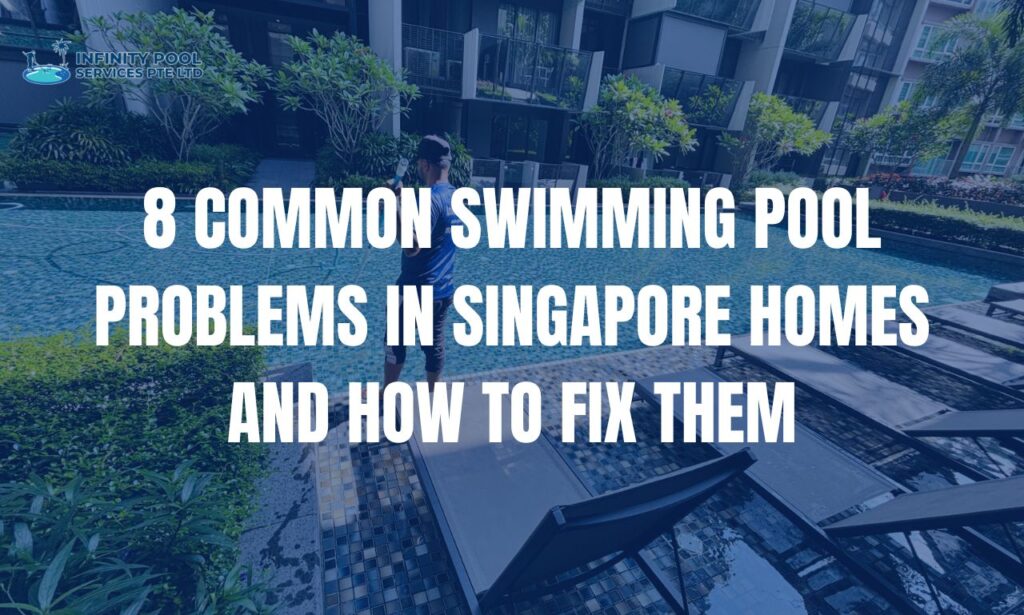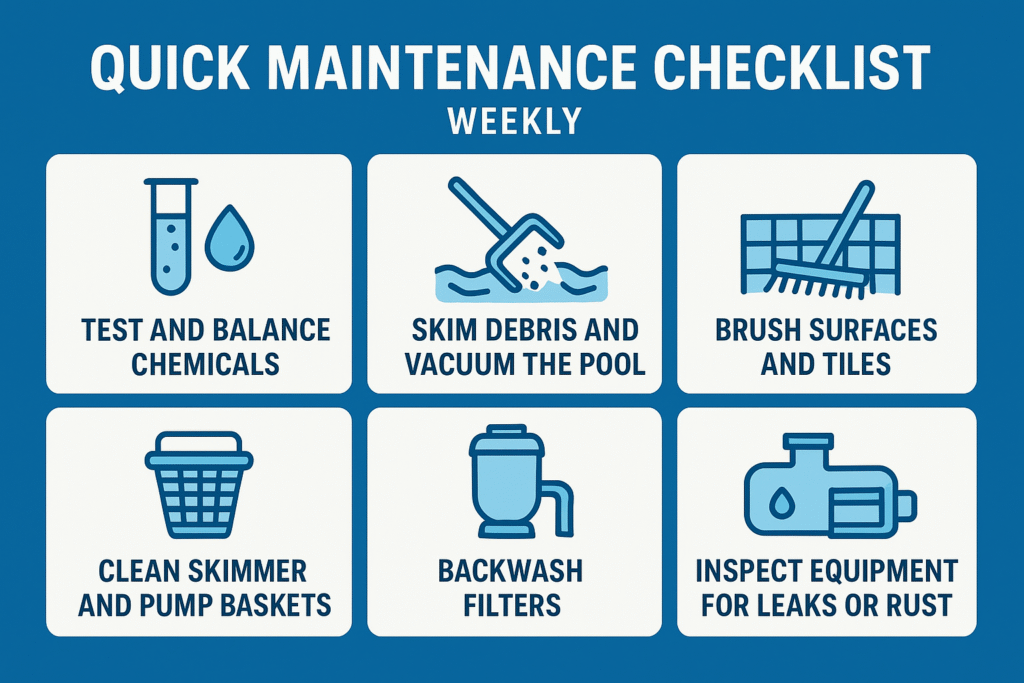It’s nice to have a pool at home, right? But after a few months, you might start noticing things, like green water, a strong chlorine smell, or maybe your pump making weird noises. These are just a few of the common swimming pool problems in Singapore homes that many people face. The hot and humid weather, plus sudden rain, makes it hard to keep pools clean and balanced.
In simple words, common pool problems in Singapore homes include algae growth, cloudy water, clogged filters, and small leaks. These issues happen mostly because of heat, humidity, and irregular cleaning. But the good news is that they’re easy to fix once you know what’s causing them. Keep reading. We’ll go through each problem, how to spot it early, and what simple steps can save your pool before it turns into a big mess.
Here are 8 Common Swimming Pool Problems in Singapore Homes and How to Fix Them
Now, let’s show you the most common swimming pool problems in Singapore homes, their causes, solutions, and when to call a professional.
1. Algae Growth in Pools
Algae love Singapore’s warm and humid weather. They make pool walls slippery and turn water green, cloudy, or even black if left untreated.
Why It Happens:
- Low chlorine levels.
- Poor circulation.
- Not brushing or cleaning surfaces.
- Direct sunlight and rainwater encourage growth.
How to Fix It:
| Step | What to Do | Why It Helps |
| 1 | Shock the pool with a high chlorine dose | Kills algae quickly |
| 2 | Brush all walls, floors, and steps | Removes algae roots |
| 3 | Run the filter for 24–48 hours | Clears out dead algae |
| 4 | Add algaecide after cleaning | Prevents future outbreaks |
Pro Tip: Test chlorine twice a week in Singapore. High heat makes chlorine evaporate faster.
When to Call a Pro:
- If algae return often or you see black spots that don’t brush off, these could be black algae, which need professional chemical treatment.
2. Cloudy or Murky Pool Water
When your pool water looks dull instead of crystal clear, it’s often due to poor filtration, chemical imbalance, or too many tiny particles floating around.
Why It Happens:
- Dirty filters.
- Imbalanced pH or chlorine.
- Dead organic matter (leaves, sunscreen, oils).
- Overcrowding in the pool.
How to Fix It:
| Test the chemicals | Ideal levels :
|
| Clean the filter |
|
| Add a clarifier |
|
| Run filtration |
|
When to Call a Pro:
- If cloudy water remains after cleaning and chemical adjustment, your filter media may need replacement, or the pump may be underperforming.
3. Chemical Imbalance (pH, Chlorine, and Alkalinity)
Singapore’s frequent rain and intense sun constantly change pool chemistry. Rainwater dilutes chlorine, and heat burns it off quickly.
Why It Happens:
- Rain lowers chlorine and alkalinity.
- Sunlight breaks down chlorine.
- Irregular testing or wrong chemical use.
How to Fix It
| Chemical | Ideal Range | Adjust Using |
| Chlorine | 1–3 ppm | Chlorine tablets or liquid chlorine |
| pH | 7.2–7.6 | Soda ash (to increase) or sodium bisulfate (to decrease) |
| Total Alkalinity | 80–120 ppm | Baking soda (to increase) |
Simple Routine:
- Test water twice a week and adjust immediately. Always add chemicals in small amounts to avoid shocking the water balance.
When to Call a Pro:
- If the water keeps turning green or your skin feels itchy after swimming, you may need a full water test and chemical recalibration by a pool specialist.
If you want to know what kind of pool works best for your home, read about saltwater vs chlorine pools – what’s better for Singapore homes to make the right choice.
4. Water Leaks
A slow leak in your pool can waste thousands of litres of water each month and damage surrounding structures.
Why It Happens:
- Cracks in the pool shell.
- Leaky pipes or fittings.
- Worn waterproofing layer.
- Loose tiles or skimmer issues.
How to Fix It:
| Step 1: Do a Bucket Test |
|
| Step 2: Check Common Leak Points |
|
| Step 3: Repair |
|
When to Call a Pro:
- Always call a pool repair expert if water loss exceeds 1 inch (2.5 cm) per day or if you notice soft, wet soil around the pool deck.
5. Pump and Filtration System Problems
Your pool pump and filter are like the heart and lungs of your pool. When they stop working, everything else follows.
Common Problems:
- Pump not starting.
- Strange noises (grinding or humming).
- Weak water flow.
- Filter pressure is too high or too low.
How to Fix It:
| Problem | Possible Cause | Simple Fix |
| Pump won’t start | Tripped breaker or motor issue | Check the electrical panel |
| Noisy pump | Blocked impeller or air leak | Clean debris, check O-rings |
| Weak flow | Dirty filter or clogged baskets | Backwash or clean filter |
| Pressure too high | Filter needs cleaning | Backwash or replace filter media |
When to Call a Pro:
- If the motor smells burnt, the pump leaks from the base, or the pressure gauge swings wildly, don’t DIY. Electrical issues and seal replacements require experts.
6. Rusting and Corrosion
High humidity and unbalanced pH can corrode metal parts and stain pool tiles, which is a common sight in Singapore’s coastal homes.
Why It Happens:
- Low pH water eats away at metal.
- Chlorine residue or salt build-up.
- Poor ventilation around pump areas.
How to Fix It:
- Keep pH above 7.2.
- Use corrosion-resistant materials like stainless steel or PVC.
- Rinse metal parts occasionally with fresh water.
- Remove rust stains using ascorbic acid cleaner.
When to Call a Pro:
- If corrosion affects your ladder, heater, or filtration pipes, replace the parts immediately with professional help to avoid system failure.
7. Pool Surface and Tile Damage
Tiles can loosen or crack due to heat expansion, poor waterproofing, or old age.
How to Fix It:
- Replace cracked tiles using waterproof adhesive.
- Re-grout every 2–3 years to prevent water seepage.
- Resurface if peeling, blistering, or rough patches appear.
When to Call a Pro:
- Large-scale cracks or peeling plaster mean the entire pool may need resurfacing, which is a job for professionals.
8. Foul Odour or Rotten Egg Smell
If your pool smells bad, it’s usually not chlorine. It’s bacteria reacting with organic waste.
How to Fix It:
- Shock the pool.
- Brush all surfaces.
- Run filtration for 48 hours.
- Test and adjust chemical levels.
When to Call a Pro:
- If the smell remains even after shocking, you might have a biofilm problem that needs specialised treatment.
Seeing all the above issues and fixes, if you want to understand how much pool care really costs, you can also check our guide on swimming pool maintenance and equipment replacement costs in Singapore.
Singapore’s Climate and Pool Care Frequency
| Climate Factor | Impact on Pool | What You Should Do |
| High Humidity | Encourages algae growth | Test chlorine often |
| Heavy Rain | Dilutes chemicals | Check pH and chlorine after rain |
| Intense Heat | Speeds up chlorine loss | Add stabiliser (cyanuric acid) |
| Sea Air (for coastal homes) | Causes corrosion | Use stainless steel fittings |
Local Tip:
- Run your pool pump at least 8 hours daily in Singapore’s heat to maintain proper circulation.
When to Call Professional Help in Singapore
You should call a reliable, affordable, and experienced swimming pool maintenance & repair company, like Infinity Pool Services Pte Ltd, when pool problems don’t go away, even after you try fixing them. For example, if algae keep coming back after shocking, you may need special chemicals.
If your pool keeps losing water, there could be a hidden leak that needs expert tools. Electrical issues in the pump or heater are risky and should only be handled by trained people. Cracks in the pool need proper repair to stop them from spreading. And if the water stays green or cloudy for weeks, it’s time for a full system check and deep cleaning by a pro.
Wrapping Up
So, hopefully, you now know about the common swimming pool problems in Singapore homes and how to fix them. Singapore’s weather makes pool care a little trickier, but with regular pool maintenance and quick fixes, you can keep your water clear, safe, and sparkling. Remember: most problems start small. Fixing them early saves you big money later. And when things look too tough, don’t hesitate to call a local pool maintenance professional. A well-maintained pool doesn’t just look good; it lasts longer and feels better to swim in.
FAQs
In Singapore’s humid and rainy weather, cleaning or pool maintenance once a week is not enough. You should skim the surface, brush the walls, and vacuum the floor at least twice a week. This keeps algae, dirt, and leaves from building up and saves you from bigger problems later.
Sometimes water loss is not from a leak but from evaporation. In Singapore’s hot sun, pools can lose up to one or two centimetres of water a day. To slow it down, use a pool cover when the pool is not in use and make sure the pump is running well for good circulation.
Mosquitoes love still water, and in Singapore, they can breed fast. Keep your pool water moving by running the pump daily and cleaning the corners where water sits. You can also use a pool cover or mosquito nets around the area if the pool is not used often.
Rainwater in Singapore can change your pool’s chemical balance very fast. After heavy rain, remove debris, check chlorine and pH levels, and adjust them if needed. Run the pump for a few hours to mix the water properly and prevent cloudy water or algae.
White scaling usually means too much calcium in your pool water. This happens when pH or calcium hardness stays high for too long. Scrub the scale gently with a soft brush and adjust the chemical balance so it does not return.
Yes, you can use tap water, but always test it first. Tap water in Singapore may have minerals that affect the pool’s balance. After refilling, check the pH, chlorine, and alkalinity levels and adjust them before swimming again.
Bubbles usually mean air is getting into the system. This can happen if the pump lid is loose or there’s a leak in the suction line. Tighten the lid and check the seals; if the problem continues, call a professional to inspect the pipes.
You can save energy by using a variable-speed pump and running it during cooler hours. Keep filters clean so the system works smoothly. Also, use a pool cover to reduce evaporation and heat loss, especially in Singapore’s sunny weather. |



